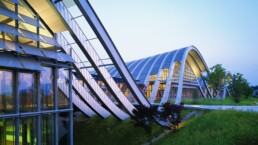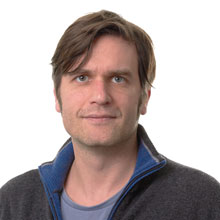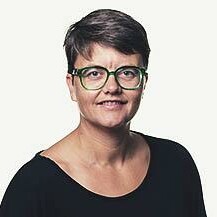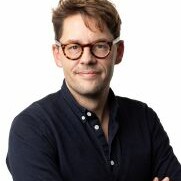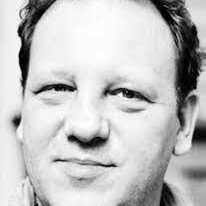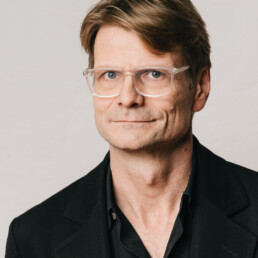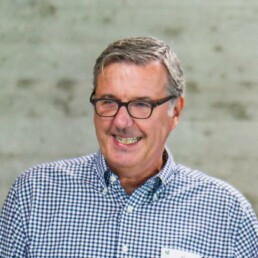Organizing museumsin digital cultures
A European Haniel Program Winter Academy
7.–12.11.2021, Bern (Switzerland)
© Zentrum Paul Klee, Bern
Besides the university, the museum is one of the oldest forms to think about and effectuate the organization and representation of knowledge, its history of ideas and its repertoire of artifacts and objects. The museum is currently undergoing an enormous shift in how it performs its own functions, propelled by the ubiquity, everydayness and agencies of digital infrastructures, information technologies and media platforms.
These socio-technical conditions are closely related to a broader societal shift towards an experience economy and the culturalization of urban life. They turn museums into exemplary sites of organizational change through and with digital media. Encompassing yet going beyond phenomena such as the digitization of »analogue« collections, online appearance, cultural marketing and museum pedagogy, today’s technological and cultural transitions call for a deeper exploration and reflection of the museum as key organizational site of knowledge, experience and sociality.
This Winter Academy will investigate the organizational challenges that museums face in digital cultures, and reflect upon responses and new practices of organizing. Students will have the unique opportunity to empirically engage with selected Swiss museums, e.g. their curators, technicians and managers. Joined by researchers of all participating universities as well as guests, we will jointly work towards an exhibition of the students’ findings on the museum as organizational site for, and in, digital cultures.
Therefore, the course “Organizing museums in digital cultures” has as learning goals, 1) understanding the changing positions and approaches of contemporary museums and how they relate to digital technologies; 2) setting up and implementing a field study of/in an important museum; and 3) constructing an exhibition experience (that exhibits the museum in the museum).
The Academy is organized in conjunction with the »Sustaining Digital Cultures for Museums« project supported by Migros Pioneer Fund, and will be carried out in cooperation with leading Swiss art museums as well as Leuphana University Lüneburg’s Centre for Digital Cultures.
The Academy will have its base in Bern, Switzerland. Thanks to the generous support of the Haniel Foundation, we can offer free accommodation as well as supporting (train) travel to Bern and back.
For Lüneburg students: If you would like to participate please send an email to haniel_esa@leuphana.de until October 15th, 2021, including max. 1 page on your motivation why you would like to attend the Winter Academy. You will then be notified about the possibility to participate until October 18th, 2021.
Please note that proof of vaccination or recovery from Covid-19 might be mandatory (2G).
Course Schedule
19:30
Joint Welcome Dinner
9.00-9.15am
Checking in at Zentrum Paul Klee
9.15-10.00
Welcome and Introduction
10.00-11.00
Organizing perspectives
11.00-11.30
Break
11.30-12.30
Forming exhibition groups (8-10 groups): organizing perspectives
12.30-13.30
Lunch
13.30-14.30
Get going in groups: reading and discussing each other’s texts, formulate key
theses (posters)
14.30-15.00
Exemplary poster presentations
15.00-15.30
Introduction to fieldwork (collective)
15.30-16.00
Break
16.00-18.30
Preparing fieldwork (prepare questions)
18.30-19.00
Fieldwork plan, feedback
9.00am-12.00pm
(Zentrum Paul Klee): Preparing fieldwork: interviews, desk research, background talks,
fieldwork logistics (Jörg/Carsten)
12.00-13:00
Lunch and transition to museums
-18.00
Fieldwork
Returning, planning/preparing next steps
9.00am-16.00pm
Fieldwork
16.00-18.00
Joint and group discussion of fieldwork and next steps
18.30
Joint dinner
09:00-10:00
How to work the with material
10:00-
Group work: Analysis of Material
14.00-
Preparing the exhibition
09:00-10:00
Setting up the exhibition
10:00-12:30
Exhibition opening and tour
12:30-13:00
Wrap-up
13:00-14:00
Lunch
Faculty and Speakers
Timon Beyes is Professor of Sociology of Organisation and Culture at Leuphana University Lüneburg. He is a director of Leuphana University’s Centre for Digital Cultures, and holds a fractional professorship at the Department of Management, Politics and Philosophy, Copenhagen Business School, Denmark. He has a background in Sociology and Management Studies and has done his doctoral and post-doctoral research at the Institute of Sociology and the School of Humanities and Social Sciences, University of St.Gallen, Switzerland. His research focuses on the spaces, technologies and aesthetics of organization in the fields of media culture, art, cities as well as higher education.
Lydia Jørgensen, PhD, is a post doc at the Department of Management, Politics and Philosophy (MPP), Copenhagen Business School, and at the Institute of Sociology and Cultural Organization, Leuphana University Lüneburg. Lydia’s research interests include atmosphere, space, design and organizational aesthetics, in relation to the aesthetic modulation of the social, the senses and the political. She is interested in and works with experimental qualitative methodologies and performative research approaches.
Maximilian Schellmann, PhD, is currently PostDoc at the Copenhagen Business School, Department for Management, Politics and Philosophy and at Leuphana University Lüneburg’s Centre for Digital Cultures in conjunction with the European Haniel Program on Entrepreneurship and the Humanities. He is also a visiting lecturer at the University St.Gallen. His research interests include Migration Studies, Urban Studies, Organization Theory, Cultural Entrepreneurship and Aesthetics.
Jörg Schulze is the CEO of maze pictures. Maze pictures is an independent production house based in Munich and Berlin, with maze pictures Swiss in Lucerne as an affiliate and a share in Red Balloon Film in Hamburg. The affiliate maze pictures Swiss addresses the increasingly urgent challenges of digital transformation for international cultural institutions. Based on a unique wealth of experience that has resulted in numerous award- winning formats, maze pictures coach and consult on all related topics – from developing an overall digital strategy to the creation of individual cooperative, digital and innovative projects. Among our clients are prestigious museums like the Metropolitan Museum of Art in New York city, Frankfurt’s Städel Museum and Schirn Kunsthalle, as well as the Kunsthaus Zurich, Kunstmuseum Basel and Kunstmuseum Bern with the Paul Klee Centre. Jörg Schulze has already held lectureships at the HSG St.Gallen, the Leuphana University in Lüneburg, as well as at the DFFB in Berlin and the Film Academy in Ludwigsburg. Together with Dr. Carsten Siebert, he is the project manager of the project “digitorials.ch”, which was developed in cooperation with the Städelmuseum in Frankfurt and the Schirn Kunsthalle and is supported by the Migros Pioneer Fund.
Carsten Siebert is Chancellor and Managing Director of the Barenboim-Said Academy in Berlin, a music academy co-founded by the conductor and pianist Daniel Barenboim and the literary theorist Edward Said. Carsten studied philosophy, linguistics and German and English literature in Munich, Berlin and Philadelphia. He holds an M.A. from the University of Pennsylvania and a Ph.D. from Humboldt University. From 1999 to 2004, he worked for McKinsey & Company. Also in 1999, he co-founded cta, a Berlin-based film PR agency. Between 2004 and 2009, he was the executive director of artist and director Robert Wilson’s Byrd Hoffman Watermill Foundation in New York and administrator of the Estate of artist George Paul Thek. He has lectured in Philosophy and Cultural Sciences at Humboldt University and the University of St. Gallen and continues an affiliation with Leuphana University Lüneburg.
Chris Steyaert is Professor for Organizational Psychology at the University of Sankt Gallen. He has published in international journals and books in the area of organizational theory and entrepreneurship. He is teaching courses on creativity in relation to the field of team dynamics, entrepreneurship and urban creativity, and experiments with pedagogical approaches drawing up aesthetic forms such as drama, dance, design, documentary and (digital) display. He edited the Routledge Companion to Reinventing Management Education (2016) with Timon Beyes and Martin Parker.
